Accused Killer’s Mom Recalls A Troubled Life

Rosalie Garcia asked her son Andrew to stay home that July night. They had just finished a fried chicken dinner, cleaned the kitchen and were preparing to watch an action movie.
But a few of Andrew’s teenage friends had parked outside their South Los Angeles apartment and kept honking insistently.
“I don’t want to go, Mom,” said Andrew.
“If you don’t want to go, don’t go,” Rosalie said.
It was only 8 p.m. when one of his friends came to the front yard gate of their two-story building on Main Street and called Andrew’s name. The driver honked again.
“All right, coming,” said Andrew, kissing Rosalie on the cheek and running out the door to the 1993 Honda Accord.
He didn’t return home that night, but Rosalie, 56, didn’t worry too much. She was used to her son’s mysterious night outings.
The next day, on July 24, 2014, the phone rang. Andrew was calling from a police station with horrifying news: he was being questioned about the brutal killing of a University of Southern California graduate student from China.
That call would change her life forever.
Andrew, 19, and his three friends — Alberto Ochoa, 17, Jonathan DelCarmen, 19, and Alejandra Guerrero, 16 — will soon go on trial in the murder of Xinran Ji. He was beaten to death with a baseball bat a couple blocks from USC.
Since the day Andrew called from the police station, Rosalie has struggled to understand how her teenage son’s life could unravel so fast.
Rosalie tirelessly defends her son, and attends all of his pre-trial hearings, often staking out a seat in the courtroom offering the best view of the defendant’s bench. But as she looks back over the past decade, she can now see warnings signs in the family’s struggle with drugs, domestic abuse, and finding shelter.
Homelessness
Andrew was the sixth child born to Rosalie and her then-husband Cresencio Garcia Jr. As a youngster, he was shy and stuttered.
“He was a perfect, beautiful little boy, ” Rosalie said. “He was very quiet.”
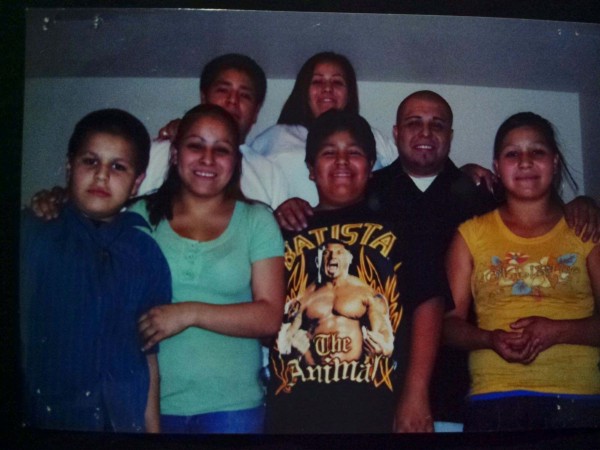
At the time, the family was living in a gang hangout motel in Pico Rivera. Worn curtains and shabby doors outfitted the two-story building that hid behind a gas station and deserted parking lot. A barbed wire fence enclosed the property.
Back then, the Lancer Motel had a reputation as a hotbed of crime and drug activity. At $45 a night, it was the only place the family could afford, Rosalie said.
When Andrew was 7, the manager asked the Garcia family to move out.
Cresencio, who is now 55, then worked at a container plant making boxes while Rosalie took care of their five children. The two eldest already had their own families.
With no money to rent an apartment or find another room, the Garcias found two shopping carts, filled them with toys, shoes and other personal belongings, and pushed them down the block to Beverly Boulevard.
“I was so upset that we had to leave the motel,” Rosalie said. “There were families that were much worse than ours, but they asked us to leave.”
For a few days, the family stayed in a nearby park in Pico Rivera, spreading mattresses and blankets from the motel room on the ground. When sprinklers went on in the morning, it was the time to leave.
But Rosalie quickly realized the park was not a good place to stay. Her children’s school, Joseph Gascon Elementary School in Montebello, was nearby, and she feared her children’s classmates would spot them sleeping in the park. She decided to keep moving.
For three years starting in 2005, the family traveled from place to place, living in neighborhoods as far apart as Skid Row and North Hollywood.
They stayed in shelters and makeshift tents constructed from blankets and bed sheets, never sleeping in the same place twice.
In the morning, Rosalie put them early on a bus so they could catch breakfast at school.
Sometimes they went to a park to picnic or rented a room to shower and let the children watch TV.
Once in the middle of such a transition, the family waited at a bus station with a pile of purses and bags. A bus driver stopped nearby, looked at the pile and kept on moving with his doors shut.
“I was embarrassed to see my kids like that, homeless,” Cresencio said.
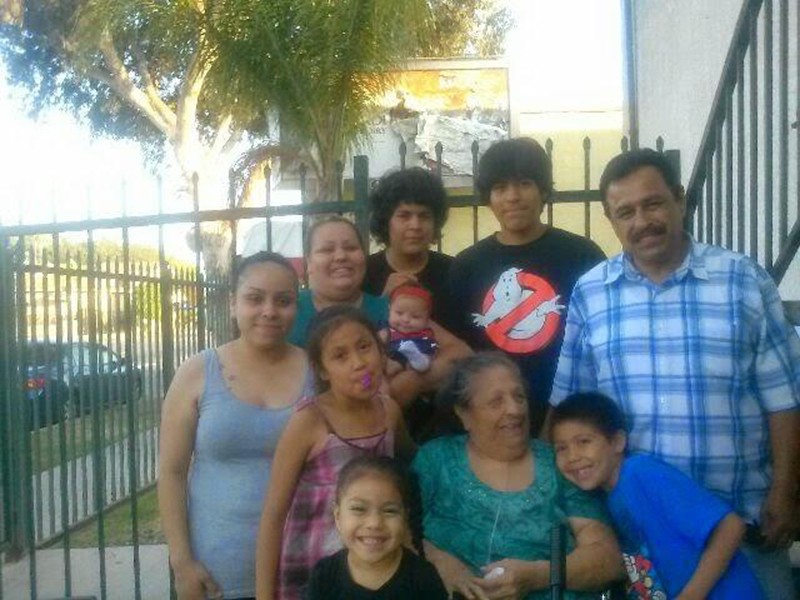
When Andrew was 7 or 8 years old, Cresencio started taking him and two other young siblings, Lillian and Nicholas, grocery shopping.
Before leaving home, he would tell the three to put on overalls and grab their backpacks. Once in a store, he would load them with groceries or school supplies and then leave the store without paying.
Lillian, 21, said she was shocked when she realized that her dad “taught us how to steal.”
“When we were little, we never had things that other kids had,” Lillian said. “So me and my sisters and our brothers would steal to get things that we needed.”
The lifestyle came with a cost. Cresencio was in and out of jail with a record of 12 charges varying from shoplifting and robbery to possession of methamphetamine from 1990 to 2014, according to Los Angeles County Superior Court documents.
“He would go to jail and come back in a week,” Rosalie said. “That’s how his life was.”
Childhood
Rosalie said she was actively involved with her children’s lives and took every opportunity to spend time with her younger sons, Nicholas and Andrew, whether walking to a burger stand near their house, strolling to a grocery store or playing Nintendo 64 video games.
When Andrew was 16 years old, Rosalie took him to a school counselor, who diagnosed him with Intellectual Developmental Disability. Among other symptoms, it manifested itself with problems with reasoning and academic learning.
Andrew struggled in school, both parents said.
“He never was the smartest kid in class,” Cresencio said. “School was pretty hard for him.”
Still, he liked to experiment in science class and enjoyed acting.
“It seemed to give him some freedom,” Rosalie said.
Alain Leroy Locke High School in South Los Angeles — where Andrew was known as a class clown — enrolls 2,600 students.
One recent Monday last spring, students in uniform — blue collared shirts and white khaki pants — strolled along the campus’ metal fence stretching along several blocks in Manchester Heights near Compton. The fence was the only division separating the schoolyard from a neighborhood claimed by two rival gangs.
Rosalie and Cresencio have both dealt with gangs in the past.
Parents
The couple grew up in an area of La Mirada known as “Dead Ends” — gang turf.
They met at a Bible study during a service. But they had stronger ties outside of church: Cresencio hung around the same Dead End gang as Rosalie’s older three brothers and two sisters.
Cresencio said that he befriended gangs when he lived in La Mirada but denied being a member of Dead Ends.
In 1977, Rosalie graduated from John Glenn High School in Norwalk and started dating Cresencio.
On sunny days, the couple cruised Whittier Boulevard together in Cresencio’s blue Cadillac and drank beer as “Always and Forever” by Heatwave blasted from the cassette player.
He was 17 years old and she was 18 when he proposed. The couple couldn’t legally marry in California, so they tied the knot in Las Vegas. On the night the couple returned, Cresencio’s parents threw a party for nearly 100 of the newlyweds’ friends and family members in their large front yard.
The party broke up when a rival gang drove by and shot into the crowd, injuring a guest — a sign of instability to come.
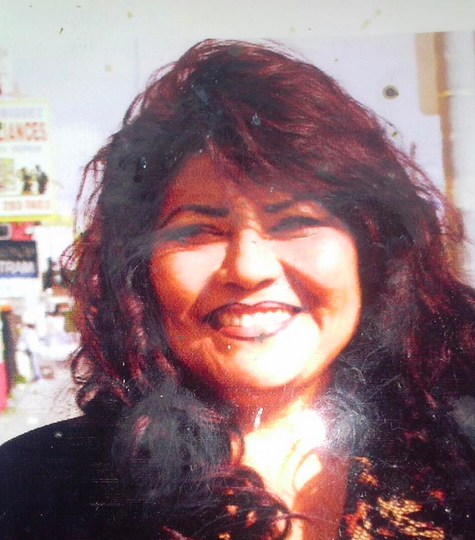
When Rosalie became pregnant with Andrew, she said she decided to stay away from the crystal meth she and Cresencio had used since they were teens. But Rosalie eventually returned to the drug, although she tried to hide it from her husband.
“She was mad because she had to breastfeed him,” Cresencio said. “She couldn’t breastfeed and do drugs. That would make her mad.”
Cresencio said he favored cocaine.
“I tried crystal meth and it made me weak,” he said. “I like to be strong.”
Despite the couple’s modest lifestyle and lack of solid income, they had cash.
The family received $1,000 in food stamps every month and “didn’t have to use any cash.”
The pair frequently brawled, with small arguments escalating into violent fights, the two recalled.
Andrew and his siblings usually took their mother’s side. Once, Andrew’s older brother Gabriel pinned his father down, telling him “stop hitting” his mom.
Cresencio acknowledged hitting hit wife, but said his wife was never the only victim.
Once, after a fight, Rosalie called her brothers to complain about her husband.
At their apartment, they escorted Cresencio to the backyard and beat him so severely that a bruise covered half of his face.
When the children asked about the injury, he told them he fell playing basketball.
“But I think they knew what really happened,” he said.
Different life for her children
By the time Andrew was 10 years old, Rosalie decided to break ties with her husband.
She signed up for the Section 8 federal housing program designed to help low-income families and moved in with her five children into a fully furnished apartment in South Los Angeles.
Rosalie also became an active member at Faith in Christ Ministries church and said she quit using drugs.
A few months later, the family found a two-bedroom apartment in the Broadway-Manchester neighborhood. Her rent: $5 a month.
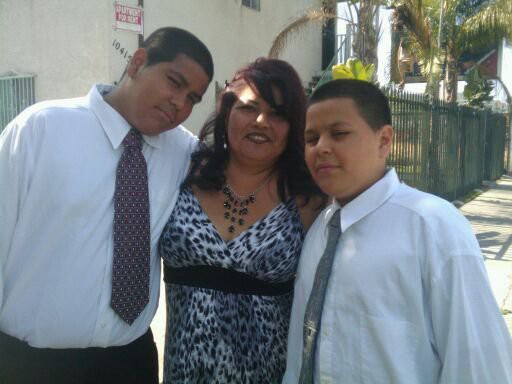
It was a happy time for Rosalie and her children as the family began recovering from homelessness and abuse.
“They were so happy that they had their apartment, friends, school, church,” Rosalie said. “Mom was not on drugs, and Dad was not around anymore to beat us up. It was heaven.”
But as Rosalie got her life in order, her son’s behavior began spinning out of control.
Rosalie and Andrew were close until he turned 14 years old and started having “his privacy thing going on,” she said.
He set his Facebook page to private and often would not come home at night. He also acquired new habits.
“He started smoking weed to self-medicate himself, so he wouldn’t have to deal with anything,” Rosalie said.
Around that time, Andrew began getting in trouble at school.
He first was disciplined for small things like disturbing classmates or missing lectures. Then bigger issues emerged.
Once he jumped on a train and went to Long Beach, where he tried to steal a CD from a video game store.
Rosalie got a call from police officer that day with news that Andrew got arrested.
As the school year progressed, Andrew started getting into bigger trouble.
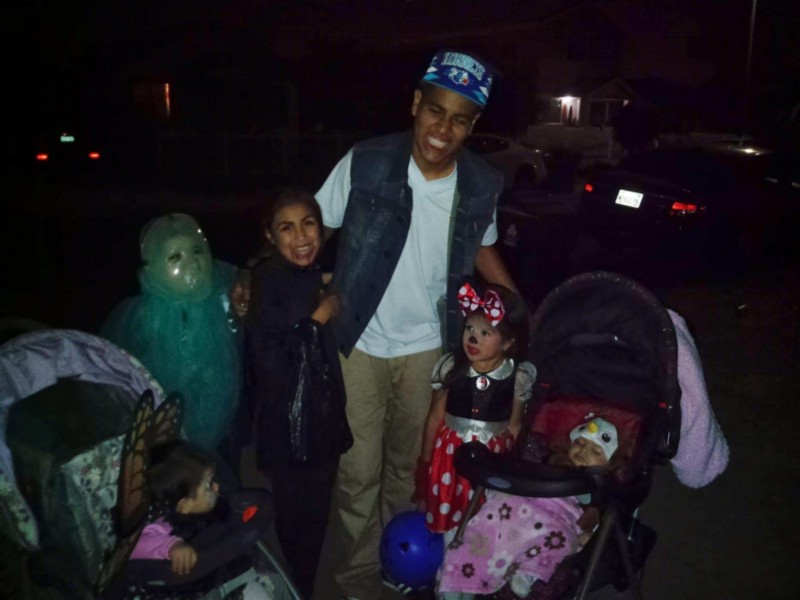
One morning, he walked into a classroom and threw his backpack on a desk. Something hit the surface hard. When the teacher opened the backpack, she found a collapsible billy club.
When Rosalie came to school, a police officer told her that the baton was bent and most likely used in a beating.
She said she worried but trusted Andrew when she said he found it on his way to school.
“When he told me that I could see his sincerity in his face and his eyes,” Rosalie said. “I knew it was not dangerous.”
Cresencio, however, told a different story. He said his son brought the baton to school after several students threatened him.
“He got in trouble for taking a weapon,” he said. “The only reason he got a weapon is when he feared for his own safety.”
Andrew was soon released, and he was never charged. School officials suspended him for two weeks.
Dropping out
Andrew stopped going to Locke High School in 2013. For Rosalie, it became normal to see him at home in the morning.
Rosalie tried to find a program for Andrew to get his high school equivalency degree or find a job. Her plans slowly faded as the semester progressed and Andrew didn’t show interest.
He told his family he was an adult and would made his own decisions.
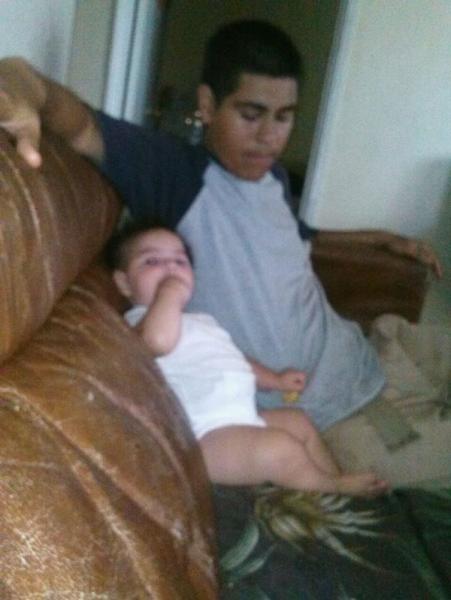
Gwynn Browne, a leader of women’s ministry at Faith in Christ Ministries, said she was not surprised when she learned that Andrew dropped out of school.
“He was very frustrated with school,” Browne said. “To me, the school was not meeting his needs.”
Andrew helped with chores. He took out trash, strolled to a market and baby-sat his nieces. He also spent hours playing video games and chatting with friends on social media.
In his Pinsta.me posts, he called himself a “pothead” and a “panty dropper” posing with a joint.
A month before his arrest, he bragged on Facebook that police “had the chopper out last night looking for me.”
He also started spending time with friends whom he never introduced to his mother.
The night of the murder
On July 24, when Andrew finally joined his friends, they went to pick up another friend.
Around 11 p.m. they stopped by the house of Jeremiah Okotieuro, Andrew’s former classmate.
Okotieuro said he was asleep when he heard Andrew banging on his window. The noise woke up his mother, and he opted to stay home.
After visiting Okotieuro, the five friends headed to the University of Southern California seeking someone to “flock,” or rob, Andrew later told detectives, who testified at a preliminary hearing.
Shortly after midnight, Andrew and his alleged accomplices spotted Ji, a 24-year-old engineering student, walking alone down West 29th Street. Andrew told detectives they approached Ji because “he was Chinese, he must have money.”
According to Deputy District Attorney John McKinney, Andrew was the first to strike Ji, smashing him in the face and knocking off his glasses. Ochoa followed him, chasing Ji down and hitting him on the head with a metal bat. Then he passed it to Garcia who struck him again and handed it to Guerrero who also slammed Ji, according to the surveillance footage presented by prosecutors.
Ji stumbled and lost his balance. For a moment, he rested against a car. Then, disoriented, he staggered toward his apartment, leaving behind a pair of broken glasses and drops of blood. When he finally reached his apartment, he crawled into his bed. He was found dead the next morning.
Detectives say the violent rampage for the teenagers didn’t end there. After beating Ji, they went to Dockweiler Beach near Torrance and attempted to rob a couple, threatening them with a knife and a basketball bat. They took $40.
Police officers detained Andrew and Ochoa shortly after the attack and a few hours later they caught two other suspects, Guerrero and DelCarmen.
The call
When Rosalie talks about that July night when Andrew left home a free man for the last time, “my heart breaks,” she said.
The next afternoon, Andrew called her and said that police had charged him with a robbery. Two hours later he called again to say he now faced even more serious charges.
“Mom, I have to tell you something,” he said. “Police charged me with murder.”
“How did that happen?” Rosalie said.
“The guy who we beat, he died,” Andrew responded. “Mom, just pray for me.”
“You have to pray for yourself, too,” she said. “Ask God to forgive you because I know you didn’t do that on purpose.”
Rosalie remembers sitting on a beige sofa-bed in a living room, her children Lillian and Gabriel next to her. She turned to her children and told them the news.
“We all just started crying and screaming because we love him so much,” Lillian said.
“He would never kill somebody”
Rosalie has said repeatedly that Andrew is not a bad person and would never kill someone.
So she looks for any possible clues to explain his actions. She said her son witnessed violence at home and because of that he would always stand up for others, especially his friends.
“Andrew is a type of guy who is trying to protect others regardless that they’re doing a wrong thing,” Rosalie said. “There were females involved. I think [Ji] was fighting back when the girl was beating him up.”
McKinney, the prosecutor, gives a different account of the evening. He said Andrew played a significant role in an attack against an unresisting and overwhelmed graduate student.
“Based on the surveillance footage we have, the victim didn’t fight back,” McKinney said.
A few weeks after Andrew was jailed, Rosalie planted a tree in a large bucket near the gates of her front yard. A small verse from the Scripture rests on the bottom of the trunk. Rosalie calls the sapling “Andrew’s tree of life.”
“Andrew didn’t finish school, and he was going to end up poor because he had no education,” she said. “He probably thought he had to be a criminal kind of person, to rob people and steal.”
Still, Rosalie finds relief in telling herself that she did everything she could to stop her son from leaving home the night of the murder.
“I’m kind of relieved that it’s not on me that much, because I warned him,” Rosalie said. “I told him I didn’t want him to go. So I don’t blame myself, which is very comforting.”
Rosalie Garcia dances with her sons Andrew and Nicholas in their South L.A. apartment, 2012. Video courtesy of Rosalie Garcia.
Contact Contributor Olga Grigoryants here and follow her on Twitter here.



